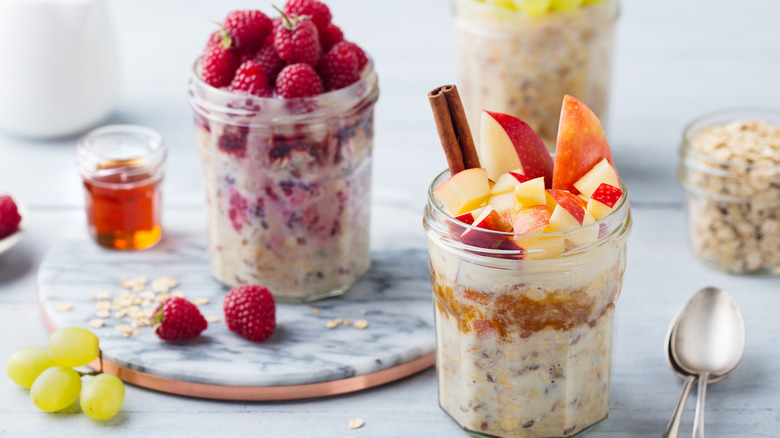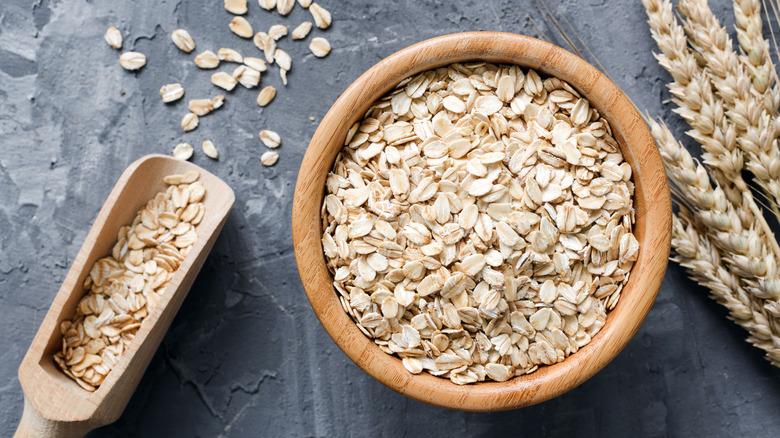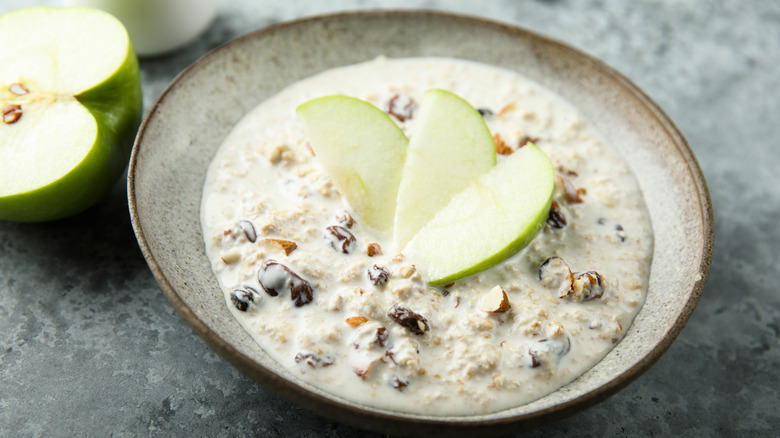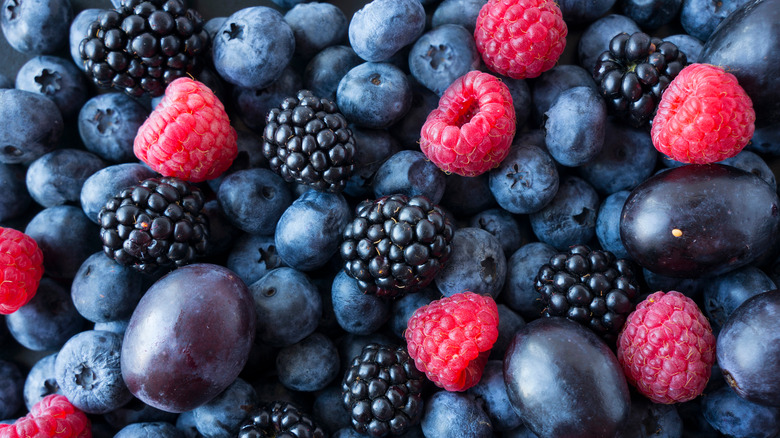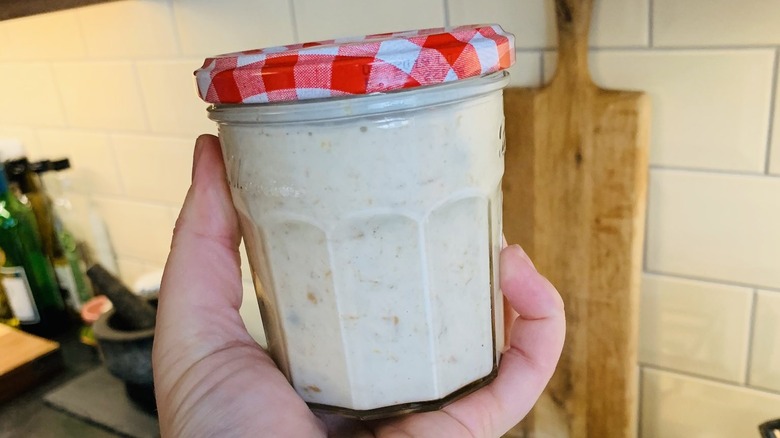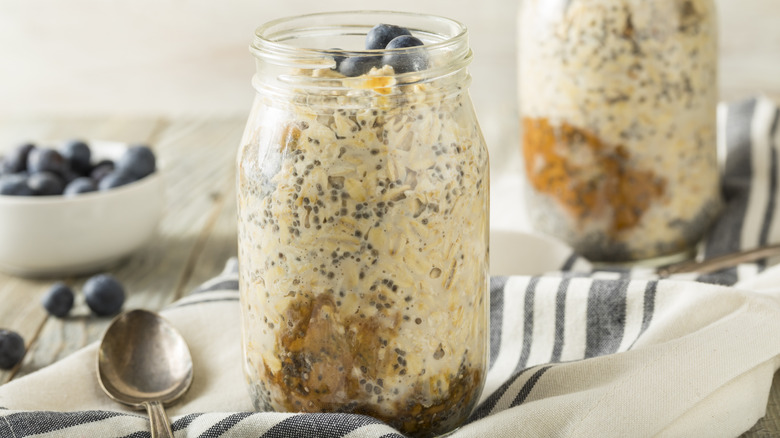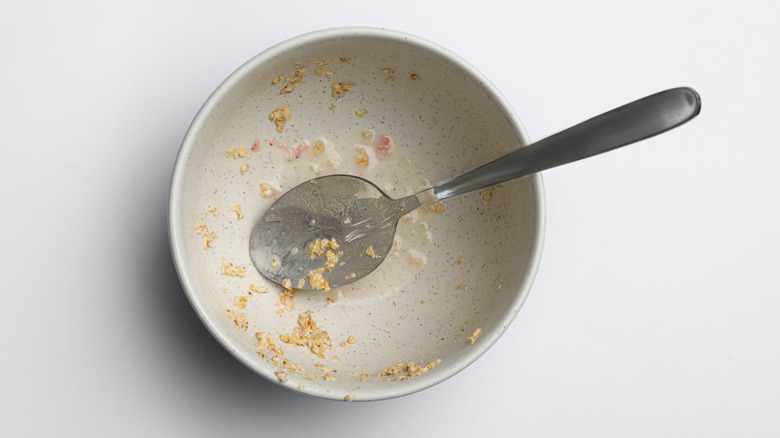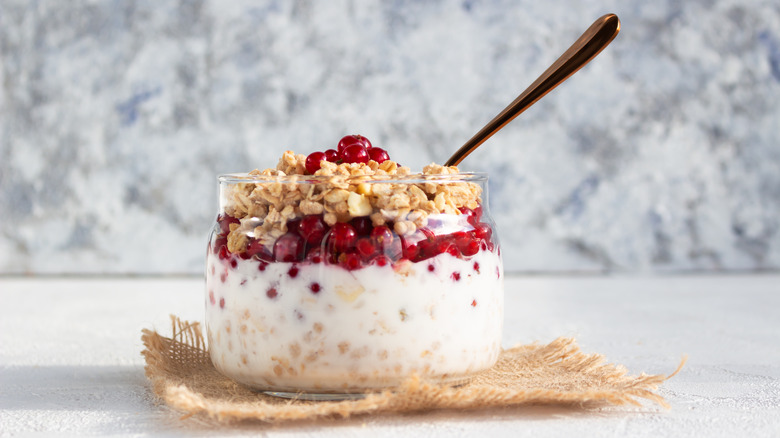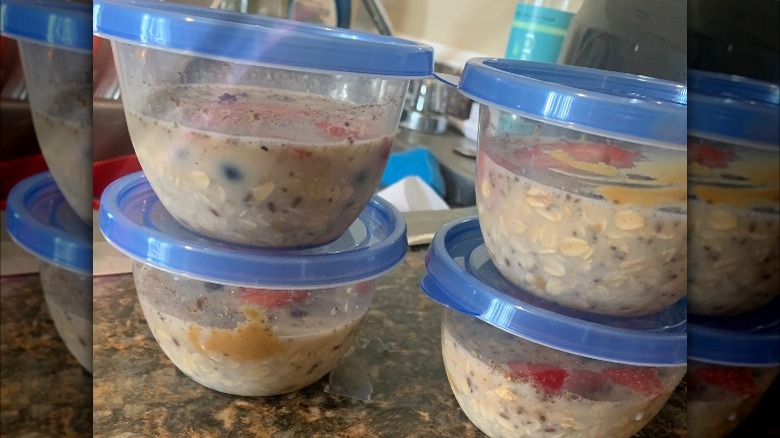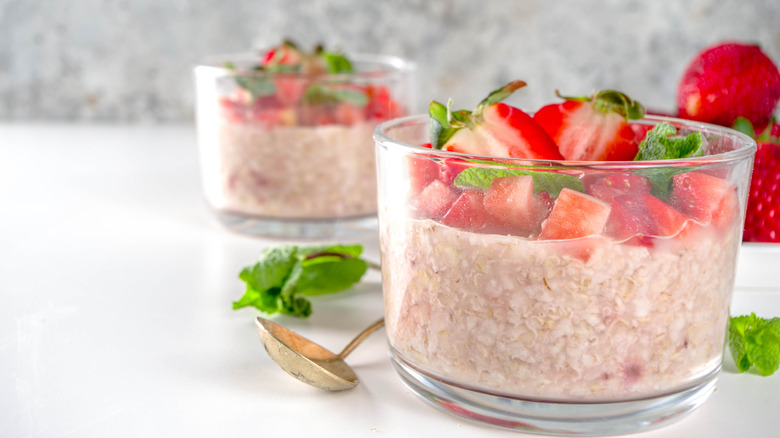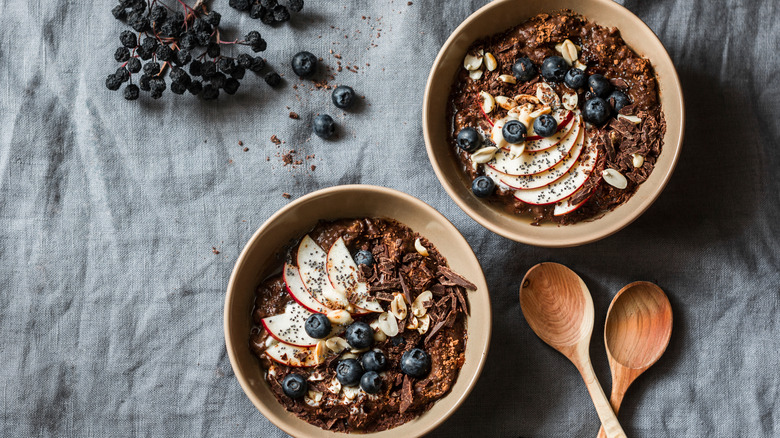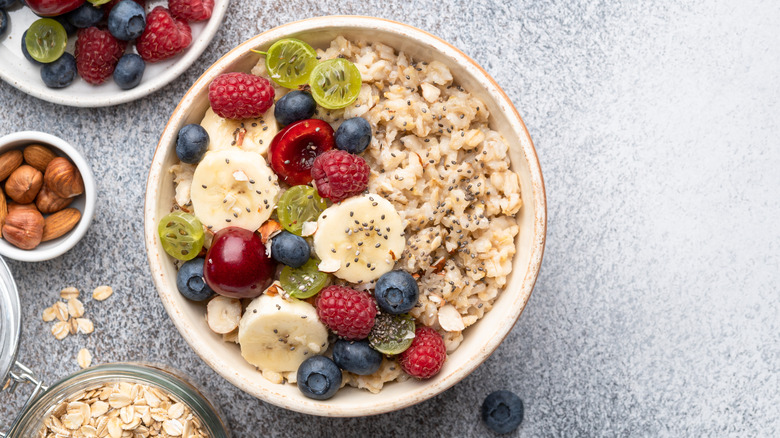12 Mistakes Everyone Makes With Overnight Oats
Mornings are a busy time of the day for most of us. Whether you are getting the kids ready for school or have a big exam or work presentation to prepare for, breakfast is often placed on the back burner or skipped altogether. In the search for a quick and easy option that is both filling and healthy, many people turn to overnight oats.
This tasty dish solves a lot of issues people run into when trying to plan breakfast. It is easy to prepare ahead of time (hence the overnight descriptor), you can customize it in a seemingly endless number of ways, and it's loaded with nutritional value. But as simple as it is to prepare, it can be just as easy to mess up.
If you are on a mission to perfect your overnight oats recipe to add to your arsenal of breakfast ideas, we have several mistakes you will want to avoid. Many of these issues boil down to personal preference, so make sure to experiment when concocting your ideal overnight oats creation at home.
1. Using the wrong oats
Let's start with a fundamental fact: Your overnight oats are going to need oats. As the key ingredient in this dish, oats will make or break your breakfast. So, it is important to make sure you are selecting the type that will enhance your dish instead of hinder it — and it all begins in the grocery store.
Typically you will come across three main types of oats in the store: rolled, quick, and steel-cut. To the casual observer, they may all seem the same, but in fact, they can make a huge difference depending on what you are preparing.
In the case of overnight oats, one Redditor warns that you should only use steel-cut oats when making overnight oats, or, as they put it, your breakfast will "taste like trash." Others agree, saying that the flavor and texture of other kinds of oats were too off-putting to enjoy. Still, it's a matter of preference since various people in the Reddit thread pointed out that they use rolled oats, which work perfectly fine. Be sure to experiment to find the variety that you'll enjoy the most.
2. Adding too much (or too little) liquid
Once you have selected your oats of choice, you'll need to combine them with liquid. Unfortunately, a common misstep people often make is with the oat-to-liquid ratio. Oats need to soak in a liquid overnight, both for flavor and to cut out the raw texture that might leave you with an upset stomach.
Here, the issue is less about what kind of liquid you choose (you will likely pick from any kind of milk or plant-based alternative), and more about the amount you add to your oats. In fact, the quantity can determine whether or not your breakfast is even worthy of repeat preparation.
For a thick consistency that is not too slimy or runny, Boss the Kitchen advises aiming for a one-to-one ratio of oats to liquid — that is, one cup of oats for one cup of liquid. You will know that you have reached an optimal texture if the oats don't drip off the spoon as you eat them. Similarly, the oats should be scoopable instead of stiff, or else you'll want to splash in some extra milk. You might still encounter sliminess from the oats releasing liquid, so adding fruit or other toppings can help mask the texture.
3. Putting all the ingredients in at once
One of the great aspects of overnight oats is that there are many ways to customize them to your liking. Just like regular oatmeal, you can add a variety of toppings, including fruits, nuts, and sweeteners. For example, if you want your overnight oats to be packed with flavor, try mixing in your favorite syrup before letting them sit overnight.
All the same, it's best to avoid adding all of your ingredients at once. While overnight oats are convenient since they can be made ahead of time, you will be doing 90% of the work in advance. As CBS News reports, the key step to accomplish right before digging into a bowl of overnight oats is to add extra toppings — not the previous night before you let the oats sit for hours to chill. Otherwise, everything will end up soggy and watered down with no distinguishing textures.
4. Not letting the oats soak long enough
We have established that the signature ingredient of overnight oats is in the name. Similarly, the preparation entails letting it sit for a decent amount of time before it can be consumed. But do your oats really have to sit overnight?
The short answer is yes, you will need to allow ample time for your oats to combine with your liquid of choice before you can eat them. Simply Oatmeal advises that you need a minimum of 12 hours in order to let the phytic acids in raw oats break down (the source of those stomachaches we mentioned earlier). Depending on how early you typically eat your first meal of the day, preparing your overnight oats around dinner time should be sufficient.
Thanks to the invention of Quaker quick oats in 1922, pre-soaking oats before use was no longer a necessary step. However, since quick oats aren't recommended for overnight oats, the longer your rolled or steel-cut oats absorb liquid, the better. If you do not have the time (or patience) to wait overnight, you can opt for regular instant oatmeal in the morning, as one Redditor suggested.
5. Forgetting to stir everything before eating
As you fall asleep at night, you're probably filled with the buzz and excitement of having your overnight oats for breakfast the next morning. When you wake up, you may dash to the refrigerator, grab your overnight oats, spoon out a — wait a second — hold it right there! You are about to make another key mistake you should avoid when making overnight oats.
Remember, your oats have been sitting untouched for hours, possibly longer if you are making a number of servings for the week. Multiple Redditors stress the importance of stirring your oats before eating them after they have been sitting overnight. One commenter added how it took them "from being ok with overnight oats to enjoying them every day." Essentially, it helps you get an even distribution of flavor and ingredients. Plus, the oats are able to better absorb the liquid they have been sitting in for hours with an extra stir.
6. Not making enough servings
The work week can get really busy with little to no warning, and meals that are quick and easy to prepare are guaranteed to become staples in your household. Saving time in the mornings is a game-changer to keep everything running on schedule. That is partly why overnight oats are such a great breakfast solution.
That leads us to the next mistake you will want to keep in mind when you start to prepare your overnight oats. Consider that making a single portion for the next morning might not be enough. You may find it such a delicious time saver that you'll wish you had made more. That's why once you have a recipe that works, you should make multiple batches at once to save time throughout the week. Meal prepping has a number of benefits, from saving money to having better control over portion sizes, according to Select Health.
Still, you will want to make sure you aren't prepping too far in advance. Insider warns that food safety can be compromised if you only prepare meals once per week. Indeed, bacteria and mold can begin to form after around four days, per USDA Food Safety & Inspection Service.
7. You aren't incorporating Greek yogurt
If you are a fan of Greek yogurt, then you will definitely want to jot down this next note. While The New Yorker humors that Greek yogurt is the perfect way to avoid "breakfast soup," the outlet is actually providing a helpful observation. Remember that liquid ratio we mentioned earlier? One way to ensure your overnight oats become thicker and creamier is to stir in some Greek yogurt the night before.
The University of Tennessee Medical Center adds a little more science to The New Yorker's dry wit, explaining that Greek yogurt carries far more protein and fewer carbs than its non-Greek counterpart. If your goal when meal prepping overnight oats is to ensure you have a healthy, albeit quick and easy breakfast, then adding a nutrition-powerhouse like Greek yogurt is key.
Your overnight oats certainly won't be ruined if you omit Greek yogurt, but if you enjoy the flavor and are aiming for a healthier start to your day, then you definitely do not want to forget to mix it in (and stir it again before eating).
8. Using the wrong container
When it comes to preparing our favorite dish or food item, the tools used to get the job done are just as important as the ingredients we consume. It's essential to make sure you are using the right container to store your overnight oats. Choosing one that is not totally airtight can lead to a mess while using one that doesn't clean well won't yield repeatable uses.
As Elite Daily puts it, overnight oats are a "no-cook Mason jar" recipe. While there are a number of alternatives you could use, Bustle points out that classic glass Mason jars are among the best options, thanks to their portability and convenient shape. If you do not have Mason jars at home but don't want to buy new containers just yet, consider what you already have.
In general, you will want to look for vessels that are easy to transport and come with a reliable and airtight lid if you are eating your breakfast on the go. Also, consider containers with wider lids that make it easy to mix ingredients.
9. Forgetting to add salt
It is easy to assume that someone would associate sweet rather than savory flavors with overnight oats. So, you may be a bit perplexed with this next tip: Make sure you are adding salt.
If you aren't aware of the magical properties salt can infuse into your dish, let this be your introduction. As one Redditor points out, it enhances other flavors, without making a dish actually taste salty (unless, of course, you are preparing a dish that is supposed to taste salty or accidentally add too much). Consequently, sprinkling just a pinch of salt into your overnight oats allows the other flavors to be heightened. Oats tend to take on a nutty and (counterintuitively) sweet taste.
Too much salt will hurt far more than it will help, so remember that less is more here. Simply put, as another Redditor exclaimed, adding a sprinkle of salt to your overnight oats is "100% NECESSARY."
10. Eating your oats at the wrong temperature
Overnight oats need to sit in your refrigerator to properly absorb the liquid, which should be consumed cold or chilled. However, this does not mean you have to eat the oats at a lower temperature too. This next mistake comes down to how you prefer your overnight oats: hot or cold.
There's no need to think you are bound to eat your overnight oats with a twinge of chill every time; you can easily heat them up in the microwave for a cozy breakfast. As Simply Oatmeal points out, while the primary way of consuming this dish is cold or straight out of the fridge, many people enjoy their breakfast served warm. Try heating the oats next time and alternate between the two styles to see what you prefer.
Whether you enjoy your overnight oats hot or cold may dictate the kind of ingredients you add ahead of time and in the morning before digging in. Both types pair well with fruit toppings, as well as a drizzle of syrup or honey. To allow thicker components to blend in more easily, mix them in before heating.
11. Not utilizing all of the ingredients available in the kitchen
Your creativity can shine when making overnight oats, so it's important to avoid stifling it by ignoring the many ingredients you likely have stored in your kitchen. Overnight oats are inherently versatile, with variations stemming from the liquid you mix in to the toppings you add before your first bite.
Glance around your kitchen and you will surely find ingredients that are begging to be included in your overnight oats. Is there a bunch of bananas sitting on your counter, a day away from no longer being useful? USA Today suggests folding in banana slices before refrigerating your oats for added flavor and sweetness. You can double down on the banana flavor by reserving some slices to use as toppings the next morning.
Any leftover apples in the kitchen? Life Hacker suggests grating them into the oat and liquid mixture before leaving everything to sit overnight. This useful trick lets you sneak more servings of fruit into your diet, plus it can improve any texture issues you may run into.
12. Forgetting to add chia seeds
Last but certainly not least, another healthy ingredient deserves to be added to your overnight oats: chia seeds. Much like Greek yogurt, you can sneak in a lot of extra nutrients to your breakfast by simply mixing the seeds into the oats and milk before refrigerating. Healthline notes that chia seeds are packed with protein, fiber (both insoluble and soluble), and omega-3 fatty acids.
Chia seeds will absorb the liquid they are added to, similar to oats. In fact, they can absorb more than 10 times their weight in liquid, according to the Harvard School of Public Health. This capacity helps chia seeds make you feel fuller for longer, so you're not reaching for the donut box by mid-morning.
Another benefit of incorporating chia seeds is that they have almost no flavor whatsoever. This makes it extremely easy to throw them into any overnight oats recipe as they will blend really well with any other ingredients you use. Just keep in mind that chia seeds develop a jelly-like goopy texture as they absorb liquid, which might be off-putting to some people.
